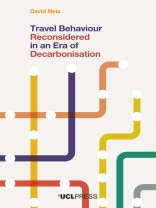The transport system is central to our lives as our means to travel, but also has major impact on our environment. This has become most salient in recent years through its contribution to climate change. However, this perspective has only had a minor impact on the conventional economic analysis and modelling of transport investments, creating a dissonance between the traditional objectives of investment and the strategic need to reduce carbon emissions to Net Zero by 2050.
Travel Behaviour Reconsidered in an Era of Decarbonisation argues that our transport networks are mature, and the objective should be to improve operational efficiency. Over the past half century, large public expenditures in roads and railways were justified by an analytic approach to the benefits of investment, primarily the value of the time saved through faster travel, to both business and non-business users of the networks. However, average travel time has not changed over this period. People have taken the benefit of faster travel as better access to people, places, activities and services, with the ensuing enhanced opportunities and choices. This book argues that the basis of orthodox transport economic analysis has been misconceived and a fresh perspective on economic analysis is now needed.
表中的内容
List of figures and tables
List of abbreviations
Preface
1 Travel behaviour today
2 Travel trends over time
3 Shock of the pandemic
4 Transport economics reconsidered
5 Transport models reconsidered
6 Demands of decarbonisation
7 Fresh approaches to travel analysis and policy
References
Index
关于作者
David Metz is Honorary Professor in the Centre for Transport Studies at UCL.












